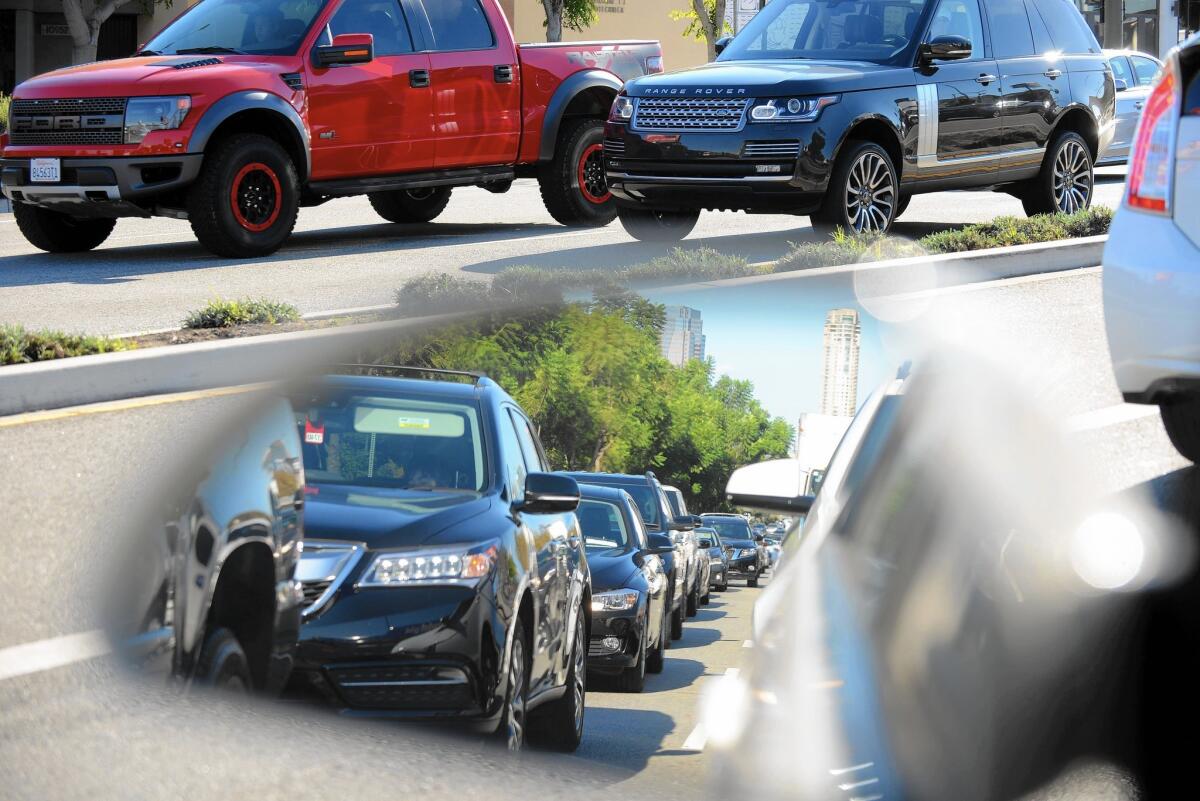A disproportionate share of blacks and Latinos lose their driver’s licenses because of unpaid tickets, study finds

Traffic in West L.A. in October. Black drivers in California were found to be arrested at higher rates than whites for driving with licenses suspended because of unpaid tickets, a new report found.
- Share via
African Americans and Latinos in California are more likely than others to lose their driver’s licenses because of unpaid tickets and then to be arrested for driving with suspended licenses, according to a report released Monday.
The report, by the Lawyers Committee for Civil Rights of the San Francisco Bay Area, examined U.S. Census Bureau data, records from the California Department of Motor Vehicles and information from 15 police and sheriff’s departments in the state to document by race the impact of unpaid traffic fines.
“Individuals who cannot afford to pay an infraction citation are being arrested, jailed and prosecuted, and are losing their licenses and their livelihoods,” the report said. “The communities impacted by these policies are disproportionately communities of color.”
Black drivers were found to be arrested at higher rates than whites for driving with licenses suspended because of unpaid tickets, the report said. The highest suspension rates in 2014 were found in poor neighborhoods with large percentages of black and Latino residents.
In Los Angeles County, black people make up 9.2% of the population but accounted for 33% of those arrested for driving with a suspended license from September 2013 to September 2015, the report said.
Whites represent 26.8% the county but accounted for only 14.8% of those arrested at that time for driving with a suspended license. During that time, 85% of 20,000 people arrested by the L.A. County Sheriff’s Department for driving with suspended licenses were black and Latino, according to the report.
In San Francisco, 5.8% of the population is black, but 48.7% of those arrested for traffic warrants in 2014 and 2015 were African American. Whites make up 41.2% of the city’s population but accounted for only 22.7% of the arrests, according to the lawyers’ group.
Join the conversation on Facebook >>
Monday’s report, based on data gathered in the last year, follows an earlier study by the group that found more than 4 million Californians had their licenses suspended for unpaid tickets since 2006. The cost of tickets soared during the state’s budget crisis because a variety of fees were added to the fines to pay for state programs.
In response to the earlier report, the state created a traffic ticket amnesty program to make it easier for drivers to get their traffic fines reduced and licenses reinstated. Court leaders also ended requirements that required drivers to pay the tickets before they could contest them.
“While these actions represent significant progress, they fail to adequately address the underlying racial and economic injustices of California’s debt collection and license suspensions policies and traffic court practices,” the new report said.
It is a misdemeanor in California to drive with a suspended license, and judges can issue warrants for drivers who fail to pay a ticket or appear in court to contest it.
On Tuesday, a state Senate committee is scheduled to hold a hearing on a bill that would prevent the DMV from suspending licenses because of an inability to pay or failure to show up in court to contest tickets.
Kacey Campbell, 34, an African American disabled veteran, was among the millions of Californians who lost his license because of traffic debt. A ticket issued in Compton in 2006 for failing to wear a seat belt was followed by a ticket in Los Angeles for driving with a suspended license. The fines eventually ballooned to $5,000, and Campbell didn’t have a license for about eight years.
Campbell said in an interview that he tried to resolve the tickets at L.A. County Superior Court. “The best I came out with was 800 hours of community service and a $200 fine,” he said.
At the time, he and his family were living in a homeless shelter, he was receiving therapy for post traumatic stress disorder and his disabled premature daughter was in the hospital, he said. He did not do the community service.
A few weeks later he saw a flier from A New Way of Life, a nonprofit group that provides services to low-income residents in South Los Angeles, and called for help. A lawyer for the group managed to have his tickets and fines dismissed, he said.
“If a lawyer is present to represent you, they know you are serious, and they know the lawyer knows the law,” said Campbell, who earns a living as a gardener and musician and now lives in Palmdale. “They just can’t slam you like they would a regular individual.”
A New Way of Life, the East Bay Community Law Center and the Western Center on Law & Poverty contributed to Monday’s report. It called for an end to license suspensions that result from an inability to pay a fine and to stop police arrests for warrants based on such suspensions.
Theresa Zhen, a lawyer with A New Way of Life, said courts would still be able to pursue unpaid tickets with debt collectors and by garnishment.
Twitter: @mauradolan
ALSO
Last flight-qualified space shuttle fuel tank in existence begins its journey to L.A.
California watchdog agency dismissed 90% of complaints about judges’ conduct in 2015
Some state lawmakers collect two paychecks: It’s legal, but ‘the optics are poor’
More to Read
Sign up for Essential California
The most important California stories and recommendations in your inbox every morning.
You may occasionally receive promotional content from the Los Angeles Times.










